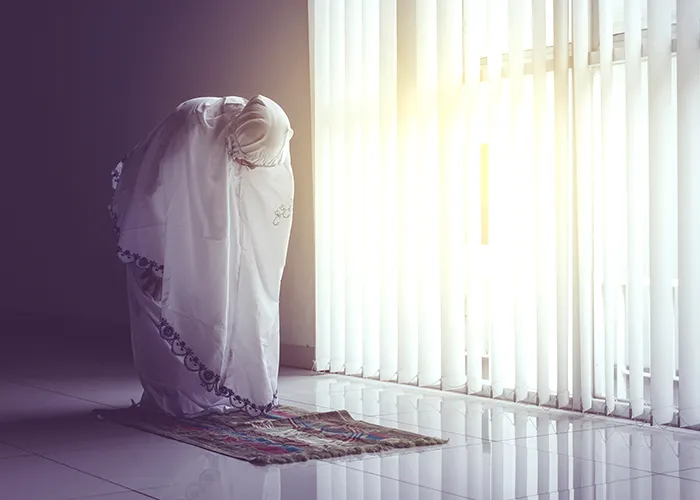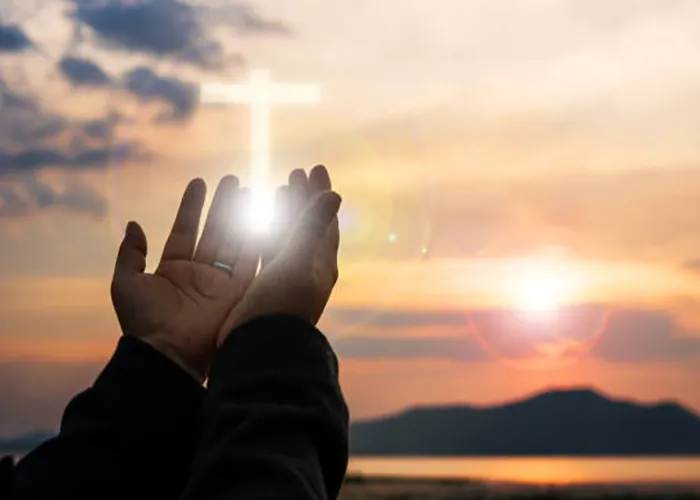Fatwa Panel of the Week – Volume02 Issue43
Obligatory Acts of Prayer
According to the fatwas of the Grand Religious Authorities: Ayatollah Sayyed Ali Khamenei, Ayatollah Sistani, and Ayatollah Makarem Shirazi (may Allah prolong their blessings):
Fatāwā presented without citing a differing opinion or a specific reference are the common rulings shared by the three respected Marāji‘. In cases where the ruling of one Marjaʿ differs from that of the other two, it is indicated in a footnote under the same number, mentioning the Marjaʿ by name.
Tranquil (stillness) during bowing (rukū‘)
1. If the body moves involuntarily while one is reciting the obligatory remembrance of Allah (dhikr) during the bowing (rukū‘) such that one loses their obligatory state of stillness, then the obligatory remembrance of Allah (dhikr) must be repeated after the body calms down.
Ayatollah Sistani: If at the time of saying the obligatory dhikr of rukūʿ one’s body moves inadvertently or unintentionally to the extent that it is no longer still, it is better that after his body has become still once more, he says the dhikr again. However, there is no problem if his body moves a little such that it does not stop becoming still, or if he moves his fingers.
Ayatollah Makarem Shirazi: Whenever a person is engaged in a mandatory dhikr (obligatory remembrance) and someone bumps into them, or their body loses stillness for any other reason, they must repeat the dhikr after regaining calmness. However, slight movements do not cause any problem.
2. If one who knows that it is obligatory to remain still while uttering the obligatory remembrance of Allah (dhikr) during the bowing (rukū‘) intentionally recites the remembrance of Allah (dhikr) of the bowing (rukū‘) before they are in a state of bowing (rukū‘) and before their body becomes still, the prayer is invalid.
3. If a person unintentionally recites the remembrance of Allah (dhikr) of the bowing (rukū‘) before they are in the state of bowing (rukū‘) or before their body becomes still, they should repeat the obligatory remembrance of Allah (dhikr) after their body becomes still.
Ayatollah Sistani: If he does this inadvertently, it is not necessary to say it again.
Ayatollah Makarem Shirazi: If one recites the dhikr before reaching the proper position of rukūʿ (bowing) and before the body becomes still, they must repeat the dhikr after attaining stillness. Even if this was done intentionally, it is recommended, as a precaution, to repeat the entire prayer afterward.
4. If a person who knows that it is necessary to keep the body still while uttering the obligatory (dhikr) remembering Allah of the bowing (rukū‘) intentionally raises their head from bowing (rukū‘) before the completion of the obligatory remembrance of Allah (dhikr), their prayer is invalid. If one by mistake begins to rise from the state of bowing (rukū‘) but before leaving that position recollects that they have not completed the remembrance of Allah (dhikr), they should make themself still and utter the remembrance of Allah (dhikr). If one realizes their error after leaving the state of bowing (rukū‘), their prayer is correct.
Ayatollah Sistani: If a person intentionally raises his head from rukūʿ before completing the obligatory dhikr, his prayer is invalid. However, if he inadvertently raises his head, repeating the dhikr is not necessary. However, If a person cannot remain in the position of rukūʿ for the length of the dhikr – not even for saying one subḥānal lāh, even without being still – then it is not obligatory for him to say it. However, the recommended precaution is that he say the dhikr even if he says the rest of it while rising from rukūʿ with a general intention of attaining proximity to Allah (qaṣd al qurbah al muṭlaqah) [i.e. with the intention of attaining proximity to Allah without specifying it is an obligatory dhikr of the prayer]. Alternatively, he should start before that [i.e. he should start saying the dhikr before reaching the position of rukūʿ with a general intention of attaining proximity to Allah].
5. It is obligatory to stand up straight after the completion of the bowing (rukū‘), and after the body has become still, one should go to prostration (sajdah). Thus, if a person intentionally goes to prostration (sajdah) before standing up straight or before their body becomes still, their prayer will be invalid.
Ayatollah Sistani: After completing the dhikr of rukūʿ, one must stand straight; and based on obligatory precaution, he must go into sajdah after his body has become still. If he intentionally goes into sajdah before standing, his prayer is invalid; and the same applies, based on obligatory precaution, if he intentionally goes into sajdah before his body has become still.
The ruling on forgetting to perform Rukū‘ (bowing).
1. If a person forgets to perform the bowing (rukū‘) but realizes his error before performing the first prostration (sajdah), one should stand up and from that standing position go into the rukū‘. If one returns to the bowing position (rukūʿ) from a bent posture, it is not sufficient, and if one suffices with this rukūʿ, their prayer is invalid.
2. If in the state of the first prostration (sajdah) or after it but prior to the second, one realises that one has not performed the bow (rukū‘) one should rise up and after standing straight perform the bow (rukū‘) and then perform two prostrations (sajdah) and finish the prayer. After the prayer, by recommended (mustaḥab) precaution, one should perform two unintentional (sahw) prostrations (sajdah) for the extra prostration (sajdah) they performed in the prayer
Ayatollah Sistani: If after one’s forehead touches the ground, one remembers that one has not performed the rukūʿ, it is necessary that one the perform rukūʿ after standing up. In case he remembers in the second sajdah, his prayer is invalid based on obligatory precaution.
Recommended acts of Ruku – (Mustahabbat of Ruku)
1. It is recommended (mustaḥab) for the praying person to glorify Allah by saying “Allaho akbar” (takbir) while standing before performing the bow (rukū‘). If the praying person is male, it is recommended (mustaḥab) that he push his knees back in bowing (rukū‘), keep his head in line with his back (rather than putting it down), support his hands by putting them on his knees, look at the place between his feet, supplicate for blessings upon the Prophet and his family (ṣalawāt) before and after the remembrance of Allah (dhikr) of the bow (rukū‘), repeat an odd number of times the remembrance of Allah (dhikr) of the bow (rukū‘), and after lifting his head from the bow (rukū‘) and standing up, when his body is still, he should say: “Sami‘allāhu liman ḥamidah”.
2. It is recommended (mustaḥab) for women to put their hands above their knees while performing the bow (rukū‘) and not to push their knees back.
editor's pick
news via inbox
Subscribe to the newsletter.




